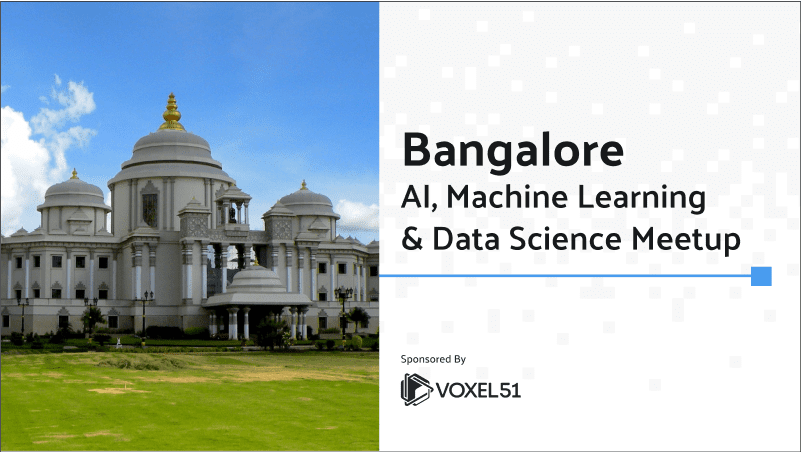May 8, 2024 AI, Machine Learning and Data Science Meetup
10 AM Pacific / 1 PM Eastern

Register for the Zoom
By submitting you (1) agree to Voxel51’s Terms of Service and Privacy Statement and (2) agree to receive occasional emails.
Talks and Speakers
To Infer or To Defer: Hazy Oracles in Human+AI Collaboration

Prof Jason Corso
University of Michigan, and Voxel51
This talk explores the evolving dynamics of human+AI collaboration, focusing on the concept of the human as a “hazy oracle” rather than an infallible source. It outlines the journey of integrating AI systems more deeply into practical applications through human+AI cooperation, discussing the potential value and challenges. The discussion includes the modeling of interaction errors and the strategic choices between immediate AI inference or seeking additional human input, supported by results from a user study on optimizing these collaborations.
About the Speaker
Jason Corso is a Professor of Robotics, Electrical Engineering, and Computer Science at the University of Michigan, and Co-Founder / Chief Scientist at AI startup Voxel51. His research spans computer vision, robotics, and AI, with over 150 peer-reviewed publications.
From Research to Industry: Bridging Real-World Applications with Anomalib at the CVPR VAND Challenge

Samet Akcay, PhD
Intel
This talk highlights the role of Anomalib, an open-source deep learning framework, in advancing anomaly detection within AI systems, particularly showcased at the upcoming CVPR Visual Anomaly and Novelty Detection (VAND) workshop. Anomalib integrates advanced algorithms and tools to facilitate both academic research and practical applications in sectors like manufacturing, healthcare, and security. It features capabilities such as experiment tracking, model optimization, and scalable deployment solutions. Additionally, the discussion will include Anomalib’s participation in the VAND challenge, focusing on robust real-world applications and few-shot learning for anomaly detection.
About the Speaker
Samet Akcay, an AI research engineer and a tech lead, specializes in semi/self-supervised, zero/few-shot anomaly detection, and multi-modality. He is recently known for his open-source contributions to the ML/DL community. He is the lead author of anomalib, a major open-source anomaly detection library. He also maintains the OpenVINO Training Extensions, a low-code transfer learning framework for building computer vision models.
Learning Robot Perception and Control using Vision with Action

Brent Griffin
Agility Robotics
To achieve general utility, robots must continue to learn in unstructured environments. In this talk, I describe how our mobile manipulation robot uses vision with action to 1) learn visual control, 2) annotate its own training data, and 3) learn to estimate depth for new objects and the environment. Using these techniques, I describe how I led a small group to win consecutive robot competitions against teams from Stanford, MIT, and other Universities.
About the Speaker
Brent Griffin is the Perception Lead at Agility Robotics and was previously an assistant research scientist at the University of Michigan conducting research at the intersection of computer vision, control, and robot learning. He is lead author on publications in all of the top IEEE conferences for computer vision, robotics, and control, and his work has been featured in Popular Science, in IEEE Spectrum, and on the Big Ten Network.
Anomaly Detection with Anomalib and FiftyOne

Jacob Marks, PhD
Voxel51
Most anomaly detection techniques are unsupervised, meaning that anomaly detection models are trained on unlabeled non-anomalous data. Developing the highest-quality dataset and data pipeline is essential to training robust anomaly detection models.
In this brief walkthrough, I will illustrate how to leverage open-source FiftyOne and Anomalib to build deployment-ready anomaly detection models. First, we will load and visualize the MVTec AD dataset in the FiftyOne App. Next, we will use Albumentations to test out augmentation techniques. We will then train an anomaly detection model with Anomalib and evaluate the model with FiftyOne.
About the Speaker
Jacob Marks is a Senior Machine Learning Engineer and Researcher at Voxel51, where he leads open source efforts in vector search, semantic search, and generative AI for the FiftyOne data-centric AI toolkit.
Prior to joining Voxel51, Jacob worked at Google X, Samsung Research, and Wolfram Research. In a past life, he was a theoretical physicist: in 2022, he completed his Ph.D. at Stanford, where he investigated quantum phases of matter.
Find a Meetup Near You
Join 12,000+ AI and ML enthusiasts who have already become members
The goal of the AI, Machine Learning, and Data Science Meetup network is to bring together a community of data scientists, machine learning engineers, and open source enthusiasts who want to share and expand their knowledge of AI and complementary technologies. If that’s you, we invite you to join the Meetup closest to your timezone.











